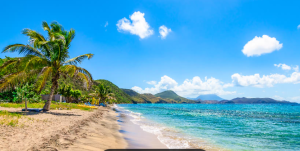The U.S. Department of State has recently issued a travel advisory, raising concerns about violent crime in popular Caribbean destinations, specifically the Bahamas and Jamaica. As travelers gear up for upcoming vacations, the advisory serves as a crucial alert regarding safety and security issues in these tropical paradises.

In the travel advisory released last week, the State Department highlighted the prevalence of violent crimes, including home invasions, armed robberies, sexual assaults, and homicides, in both the Bahamas and Jamaica. The advisory categorizes the travel risk for the Bahamas at level 2, recommending travelers to “exercise increased caution.” Meanwhile, the situation in Jamaica is considered more severe, with a level 3 advisory advising individuals to “reconsider travel.” This level is one step below the department’s highest advisory level 4, which recommends travelers “do not travel.”
The advisory is based on reported incidents, and statistics indicate a concerning number of murders in both countries since the beginning of the year. In the Bahamas, there have been 18 reported murders, while Jamaica has witnessed 65 such incidents. Most of these cases are linked to gang-related violence, contributing to an atmosphere of heightened concern.
While these advisories may raise questions about the safety of travel to these destinations, local travel experts emphasize that it is generally safe if certain precautions are taken. Teresa Gonzales, the manager for Gulliver’s Travel Duck Creek, recommends using reputable travel agencies and staying in groups, especially during nighttime activities. Implementing a buddy system and remaining vigilant are essential measures to enhance personal safety.
In addition to the risk of violent crime, the State Department’s advisory also alerts travelers to potential challenges in accessing healthcare. In case of emergencies, it notes that high-level or specialized healthcare may not be readily available, and individuals may be required to pay for medical care upfront.
The issuance of travel advisories underscores the importance of informed decision-making for travelers, particularly as spring break plans are underway. It encourages individuals to stay updated on the latest information, exercise caution, and adopt a proactive approach to personal safety.
As the travel landscape evolves, travelers are urged to remain vigilant, follow official guidance, and consider the implications of travel advisories before finalizing their plans. The priority is to ensure that individuals can enjoy their vacations while prioritizing their safety and well-being in unfamiliar environments.
